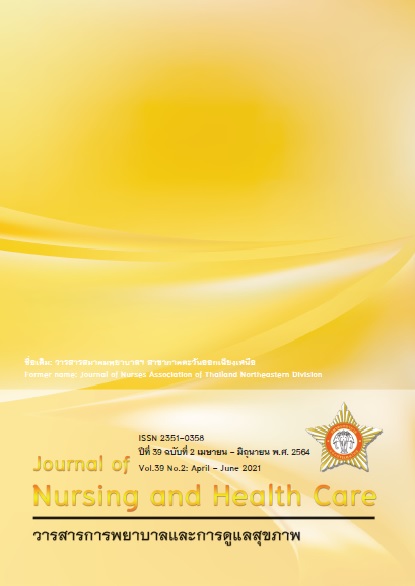ผลของโปรแกรมสุขภาพตามแนวคิดแบนดูราโดยใช้เกมมิฟิเคชันต่อการรับรู้สมรรถนะแห่งตน ในการดูแลสุขภาพของเด็กวัยเรียนโรคธาลัสซีเมีย
คำสำคัญ:
การรับรู้สมรรถนะแห่งตน เกมมิฟิเคชัน การดูแลสุขภาพ เด็กวัยเรียนโรคธาลัสซีเมียบทคัดย่อ
การวิจัยกึ่งทดลอง เพื่อศึกษาผลของโปรแกรมสุขภาพตามแนวคิดแบนดูราโดยใช้เกมมิฟิเคชันต่อการรับรู้สมรรถนะ แห่งตนในการดูแลสุขภาพของเด็กวัยเรียนโรคธาลัสซีเมีย กลุ่มตัวอย่างเป็นเด็กวัยเรียนโรคธาลัสซีเมีย จำนวน 60 คน แบ่งเป็นกลุ่มควบคุม 30 คน และกลุ่มทดลอง 30 คน กลุ่มควบคุมได้รับการพยาบาลแบบปกติ ส่วนกลุ่มทดลองได้รับโปรแกรมสุขภาพตามแนวคิดแบนดูราโดยใช้เกมมิฟิเคชันในการส่งเสริมการรับรู้สมรรถนะแห่งตนในการดูแลสุขภาพของเด็กวัยเรียนโรคธาลัสซีเมีย เก็บรวมรวมข้อมูลโดยใช้แบบสัมภาษณ์การรับรู้สมรรถนะแห่งตนในการดูแลสุขภาพของเด็กวัยเรียน โรคธาลัสซีเมีย ได้ค่าดัชนีความตรงเชิงเนื้อหาเท่ากับ 0.94 และตรวจสอบความเที่ยงได้ค่าสัมประสิทธิ์แอลฟาของครอนบาคเท่ากับ 0.86 วิเคราะห์ข้อมูลโดยใช้สถิติเชิงพรรณนาและสถิติความแปรปรวนแบบวัดซ้ำ ผลการศึกษา พบว่า ค่าเฉลี่ยคะแนนการรับรู้สมรรถนะแห่งตนในการดูแลสุขภาพของเด็กวัยเรียนโรคธาลัสซีเมียกลุ่มทดลองในระยะหลังการทดลองทันที และหลังการทดลอง 1 สัปดาห์ สูงกว่าก่อนการทดลอง และสูงกว่ากลุ่มควบคุมที่ได้รับการพยาบาลปกติอย่างมีนัยสำคัญทางสถิติ (p<0.001) ดังนั้น พยาบาลสามารถนำโปรแกรมนี้ไปใช้ในการส่งเสริมการรับรู้สมรรถนะแห่งตนในการดูแลสุขภาพของเด็ก วัยเรียนโรคธาลัสซีเมีย
Downloads
เอกสารอ้างอิง
2014.
2. Viprakasit V. Comprehensive management for thalassemia. Journal of Hematology and Transfusion
Medicine 2013; 23(4): 303-20.
3. Ngokwong C, Tangvoraphonkchai J. The effect of learning program through a group process and
cartoon storybook on self-care behavior in school age children with Thalassemia. Journal of nursing
science and health 2012; 32(3): 39-46.
4. Dominguez A, et al. Gamifying learning experiences: Practical implications and outcomes. Computers
& Education 2013; 63(2013): 380-392
5. Poondej C, Lerdpornkulrat T. Learning management with the gamification concept. Journal of
Education Naresuan University 2016; 18(3): 331-339.
6. Bandura A. Self-efficacy: Toward a unifying theory of behavioral change. Psychological Review 1997; 84
(March): 191-215.
7. Brian CH, Sunit PJ. Evaluating the ASTHMAXcel mobile application regarding asthma knowledge and
clinical outcomes. Respiratory Care 2020; 65(12). doi.org/10.4187/respcare.07550.
8. Theng Y, Lee JWY, Patinadan PV, Foo S. The use of videogames, gamification, and virtual
environments in the self-management of diabetes: A systematic review of evidence. Games for Health
Journal 2015; 4(5):doi.org/10.1089/g4h.2014.0114
9. Sunsalah N, Ua-kit N. The effect of perceived self-efficacy promoting program on self-care behavior
among school age children with thalassemia. Journal of Nursing Science Chulalongkorn University
2016; 28(1): 103-112.
10. Lumnoi U, Ua-kit N. The effect of perceived self-efficacy program on self-management behavior
among school-age children with asthma Thai Pediatric Journal 2552; 16(2): 108-121.
11. Behnam V, & et al. Effect of storytelling on self-efficacy in children with thalassemia: Application of
Bandura’s social cognitive theory. Journal of health and care 2015; 17(3): 230-239.



